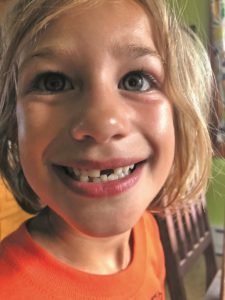Tooth decay is preventable but it’s still the most common chronic disease of children and adolescents, according to the Centers for Disease Control. With February being Children’s Dental Health Month, the Independent went to local dentists and school nurses for a checkup. Their diagnoses were mixed, and came with doses of advice on prevention.
Truro Central School Nurse Helen Grimm said that it is “not unusual” to see students who are distracted from their lessons, and not just because they’re wiggling their loose baby teeth. They’re distracted by mouth pain. Although students generally have good hygiene, she said, there’s “huge room for improvement” when it comes to their teeth.

At Wellfleet Elementary School, nurse Claudia Cope said the situation is different. “It’s rare that kids don’t get dental care,” Cope said.
Cope believes the difference between her experience in Wellfleet and Grimm’s observations in Truro arise from greater numbers of people facing cultural and socioeconomic barriers there.
At Truro Central, 34.9 percent of students are economically disadvantaged, 45.3 percent are “high need,” and 64.2 percent are white. At Wellfleet Elementary, 28.6 percent of students are economically disadvantaged, 37.1 percent are high need, and 82.9 percent are white. These statistics are from the Mass. Dept. of Education.
The differences are small, but they are there: Truro has more special needs students, more disadvantaged students, and fewer white students.
Grimm sees those differences affecting awareness and time. “For families without a car,” she said, “transportation to dentist appointments can be a challenge.”
As far as insurance coverage for dental care, Cope thinks the existing system is meeting the needs of the community. Even those covered only by MassHealth, she said, will be able to get the care they need without leaving the Cape. Harbor Community Dental Center in Provincetown and Ellen Jones Community Dental Center in Harwich both accept MassHealth and Health Safety Net.
For more complex cases, patients need to get to the Ellen Jones center or to Hyannis for a specialist. The Outer Cape does not have a pediatric dentist.
“As a general dentist, I have training in pediatric dentistry,” said Dr. Gerard Kinahan of Truro. “But it’s not nearly as advanced or in depth as someone who focuses on it.” The specialty requires two years of study beyond dental school. “Pediatric dentists are trained in behavior modification and pharmacology,” which, Kinahan said, “makes the children’s experience easier on everybody.”
Should the Outer Cape have its own pediatric dentist? Grimm thinks there “absolutely” should be one. But the consensus seems to be that the population of children here is not large enough to make that work.
Both Kinahan and Dr. Cheryl Andrews, who practices in Provincetown, said only a small number of their patients are under 15 years old. They both refer their youngest patients with extensive needs to specialists. Kinahan suggested that a pediatric dentist here would be “lovely,” and said it might succeed as a satellite office of one of the up-Cape practices.

Good dental care in childhood can set kids up for a lifetime of healthy teeth, said Elise Cozzi, who retired as a clinical professor of pediatric dentistry at Yale New Haven Hospital and lives in Provincetown.
“Tooth decay is actually caused by a bacterial infection, caries,” Cozzi said, and a little-known fact is that a pregnant woman with untreated dental issues can pass the decay-causing bacteria on to her child. “Teeth are at risk as soon as they come into the mouth,” she said.
In general, kids should avoid very sugary foods, like juice boxes. Going to bed with a bottle of milk can also pose problems, as the natural sugars in milk can lead to decay.
Tap water on the Cape is not fluoridated. And although Andrews is not a proponent of fluoridating town water supplies, “the stats are astonishing,” she said, adding that a tiny increase in the amount of fluoride in teeth can make them much more resistant to decay. “I’m a big proponent of using fluoride as needed.
“If I had kids, they’d be on fluoride until age seven or eight,” Andrews said. “If you want to put me out of business, that’s what you do.”
There are two types of fluoride and, for children, dentists recommend both. The first is systemic: you ingest it so that fluoride ions actually grow into the teeth, replacing a tiny fraction of calcium ions there, making them stronger. Once children’s teeth stop forming, they don’t need to take systemic fluoride anymore; brushing with fluoride toothpaste is enough.
In terms of timing, kids should see dentists at around one year old, when their first teeth begin coming in. Once you’ve got a general dentist, you can make a plan for care.
All Outer Cape schools offer free clinics twice a year with dental hygienists who come into the school to provide quick cleanings and fluoride sealants. They can check to make sure there aren’t any problems. It’s optional, however, and not all parents sign up.
“Every child should see a dentist twice a year — no matter what,” Andrews said.
